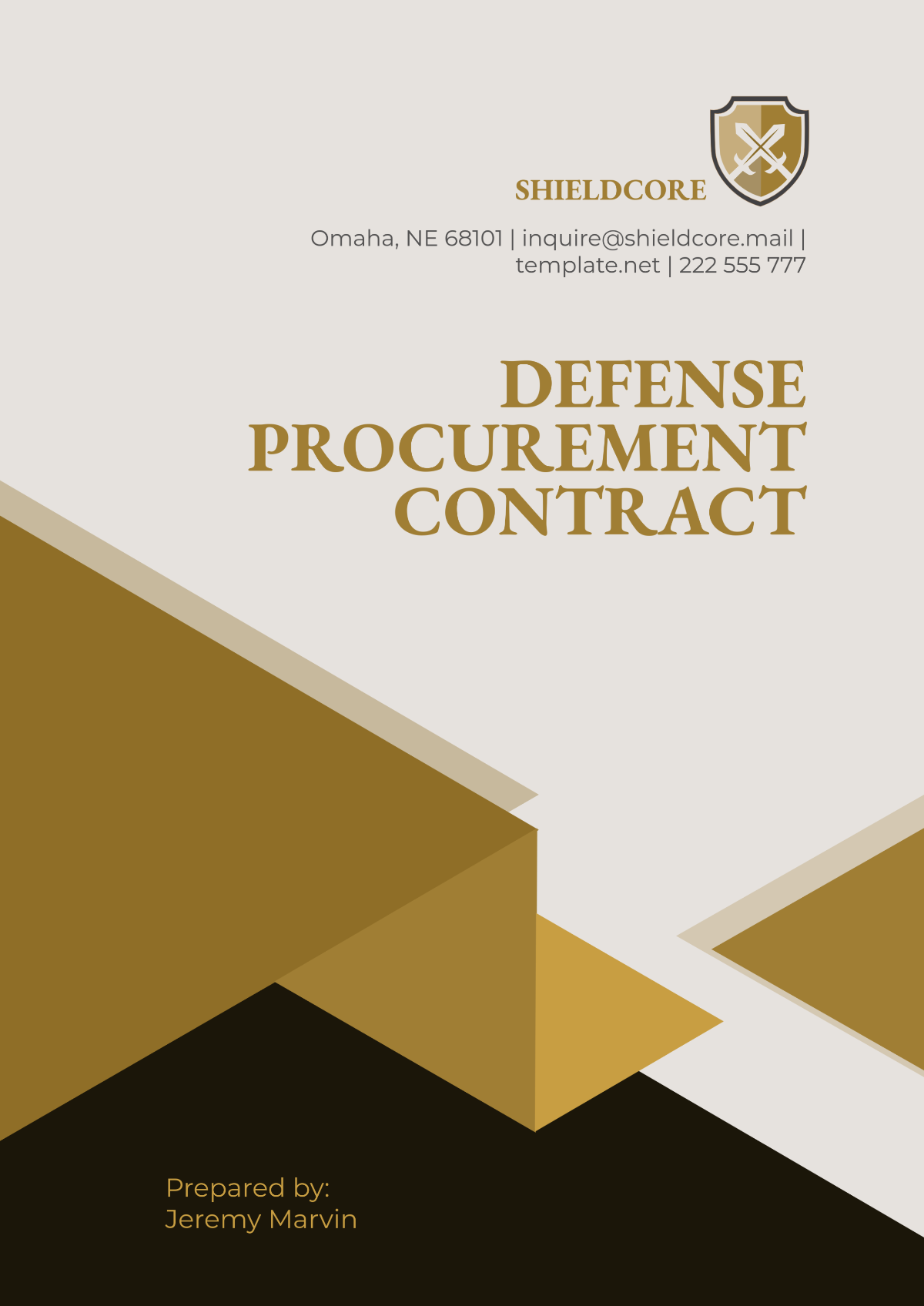Legal Contractual Terms and Conditions Training Guide
I. Introduction
Welcome to the Legal Contractual Terms and Conditions Training Guide for [Your Company Name]. This guide is designed to provide our team members with a comprehensive understanding of the legal aspects of contracts that our company engages in, with a focus on the terms and conditions that govern these agreements. Our objective is to ensure that you are well-equipped to review, negotiate, and manage contracts effectively, thereby protecting our company's interests and minimizing legal risks.
Purpose
The purpose of this training guide is to:
Enhance understanding of legal contracts within [Your Company Name].
Provide insights into the key terms and conditions typically found in contracts.
Offer guidance on negotiating contracts in a manner that aligns with our company's objectives and legal obligations.
Empower employees to identify and mitigate potential legal risks associated with contracts.
Scope
This guide covers:
Basic legal concepts related to contracts.
Common contractual terms and their implications.
Strategies for negotiating favorable terms.
Best practices for managing and monitoring contractual obligations.
II. Understanding Legal Contracts
A. Overview of Contract Law
Contract law governs the creation and enforcement of agreements between parties. It ensures that promises made in contracts are legally binding and enforceable in a court of law, providing a mechanism for resolving disputes. Here are the essential elements required for a contract to be considered valid:
Elements | Description |
|---|---|
Offer | One party must propose an agreement with specific terms to another party. |
Acceptance | The other party must agree to the offer's terms without modification. |
Consideration | Something of value must be exchanged between the parties. This could be in the form of money, services, or an agreement not to do something. |
Capacity | All parties must have the legal ability to enter into a contract, which generally means they are of sound mind and not minors. |
Legality | The contract's purpose must be legal and not against public policy. |
Understanding these elements is fundamental for [Your Company Name]'s employees to recognize what constitutes a legally binding agreement and the importance of ensuring all elements are present in every contract the company enters into.
B. Types of Contracts
Contracts can vary significantly in terms of their structure, complexity, and the method by which they are agreed upon. Familiarity with different types of contracts is essential for effectively managing them:
Written vs. Oral Contracts: While oral agreements can be legally binding, written contracts are easier to enforce and are required for certain types of agreements (e.g., real estate transactions, agreements lasting more than a year).
Standard Form Contracts: These are pre-prepared contracts where the terms are set by one party, and the other party has little or no ability to negotiate more favorable terms. Common in consumer agreements, insurance policies, and employment contracts.
Custom Contracts: Tailored agreements that are negotiated and drafted to suit the specific needs and circumstances of the parties involved. These are often used in complex business transactions or partnerships.
C. Importance of Contractual Terms and Conditions
The terms and conditions of a contract detail the rights and obligations of each party. They define what each party has agreed to do or not do, the timelines for these actions, and the consequences of failing to meet these obligations. Understanding the significance of these terms is crucial for:
Ensuring Compliance: Employees must ensure that the company complies with all contractual obligations to avoid legal penalties and reputational damage.
Risk Management: Identifying and understanding the risks associated with specific terms and conditions allows the company to mitigate potential negative outcomes.
Strategic Negotiation: Knowledge of contractual terms is essential for negotiating contracts that align with the company's interests and strategic goals.
III. Key Contractual Terms and Their Implications
A. Definition of Common Terms
Understanding these terms is crucial for comprehending the scope and obligations of a contract:
Terms | Description |
|---|---|
Confidentiality | Ensures that sensitive information exchanged during the contract's term remains private. Breaches can lead to legal action and damage to the company's reputation. |
Liability | Defines the extent to which each party is responsible for any losses or damages. Limitation of liability clauses can protect the company from significant financial burdens. |
Indemnification | One party agrees to compensate the other for any harm or loss arising from the contract. This is critical for managing potential legal or financial exposures. |
Termination | Specifies conditions under which the contract can be ended prematurely, including breach of contract, mutual agreement, or external circumstances. |
Dispute Resolution | Outlines the process for resolving disagreements, which can include negotiation, mediation, arbitration, or litigation. This clause is vital for avoiding costly and time-consuming court battles. |
B. Understanding Clauses
Special clauses can significantly impact the contractual relationship:
Force Majeure: Excuses a party from fulfilling their obligations due to uncontrollable events (e.g., natural disasters, war). Understanding its application is crucial for risk management.
Severability: Ensures that if one part of the contract is invalid, the rest remains enforceable. This protects the integrity of the contract.
Entire Agreement: Confirms that the written contract represents the full agreement between parties, superseding any previous discussions or agreements.
C. Special Considerations
Certain considerations require special attention due to their potential impact:
Intellectual Property Rights: Critical for contracts involving creative work or inventions, protecting the company's and individuals' creations.
Compliance with Laws: Contracts must adhere to current laws and regulations. Non-compliance can result in legal penalties and damage to the company's reputation.
IV. Negotiating Contractual Terms
A. Preparation for Negotiation
Effective negotiation begins with meticulous preparation. Employees should:
Understand [Your Company Name]'s Objectives: Clearly define what the company aims to achieve with the contract, including non-negotiable terms and areas where flexibility exists.
Know the Other Party: Research the other party's business, their needs, and their negotiation style. Understanding their priorities can provide leverage during negotiations.
Assess the Legal Landscape: Familiarize yourself with any laws and regulations that may affect the contract. This knowledge is crucial for ensuring compliance and identifying potential legal pitfalls.
B. Strategies for Effective Negotiation
Negotiation is an art that balances firmness with flexibility. Effective strategies include:
Prioritizing Key Terms: Identify which contract terms are most important to [Your Company Name] and focus negotiations on these points.
Building Rapport: Establishing a positive relationship with the counterpart can facilitate a more collaborative negotiation process.
Using 'If-Then' Statements: This technique can help in making concessions seem more reasonable, e.g., "If you agree to X, then we can accommodate Y."
Seeking Win-Win Outcomes: Aim for agreements that benefit both parties, fostering long-term relationships and reducing the likelihood of future disputes.
C. Documenting Agreements
The importance of accurately documenting negotiated terms cannot be overstated. Steps include:
Clear Language: Ensure that the contract language is clear and unambiguous to prevent misunderstandings.
Final Review: Before signing, have the contract reviewed by legal professionals within [Your Company Name] to ensure all terms are correctly captured and legally sound.
Change Management: Document any changes or amendments thoroughly, with explicit agreement from all parties involved.
V. Managing and Monitoring Contracts
A. Contract Management Practices
Efficient contract management is key to realizing the benefits of agreements and mitigating risks:
Contract Database: Maintain a centralized database of all contracts, including key terms, deadlines, and responsibilities. This facilitates easy access and monitoring.
Obligation Tracking: Implement a system to track compliance with contractual obligations, including deliverables, payments, and reporting requirements.
Regular Reviews: Schedule periodic reviews of contracts to assess performance, compliance, and to identify any issues that need addressing.
B. Risk Management
Proactively managing contractual risks protects [Your Company Name] from potential liabilities:
Risk Identification: Conduct regular assessments to identify risks associated with contracts, such as financial, legal, or reputational risks.
Mitigation Strategies: Develop and implement strategies to mitigate identified risks, such as obtaining insurance, setting aside financial reserves, or renegotiating terms.
C. Renewal and Termination
Understanding and managing the lifecycle of a contract ensures that [Your Company Name] retains control over its contractual relationships:
Renewal Process: Monitor contract expiration dates closely and evaluate whether renewing, renegotiating, or terminating the contract is in the company's best interest.
Termination Clauses: Be familiar with the contract's termination clauses to ensure that [Your Company Name] can exit agreements without incurring significant penalties if necessary.
VI. Best Practices and Guidelines
To ensure successful contract management and negotiation, employees should adhere to the following best practices:
Best Practices | Description |
|---|---|
Continuous Learning | Stay informed about changes in contract law and industry standards. |
Documentation and Record-Keeping | Maintain meticulous records of all contract negotiations, amendments, and communications. |
Team Collaboration | Engage cross-functional teams in the contract process to leverage diverse expertise and insights. |
VII. Conclusion
Through this guide, [Your Company Name] aims to empower employees with the knowledge and tools necessary for effective contract management. By understanding and applying the principles outlined herein, staff can protect the company's interests, minimize legal risks, and contribute to the organization's overall success.

















































